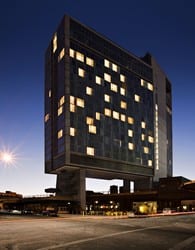RT: This [HD] issue focuses on hotel design, its past, present, and future. Regarding the past, I talked about how hotels went from kind of personal homes, and then into places of personal visits. And then the luxury hotel had to accommodate not only wealthy people, but also their entire staffs. And then they were destinations. And then what happened when the railroad came in: businesses started expanding because of the availability of the railroad for less expensive transport, railway station locations became prime, and as time went on, those locations became sub-prime because of airports. The periods when we went from the super luxurious, with people traveling with a huge retinue, to the paring down, when stables turned into garages and everybody’s arriving by cars and taxis. So where are we today? What do you think, for instance, is the most important trend?
JT: I think the most important trend is proving a multidimensional experience.
RT: So the hotel is no longer a lodging place. It’s an experience center.
JT: Yes, and important in that it is transformation. And evolution.
RT: How would transformation and evolution apply to a hotel?
JT: Right now, everyone is going through kind of a reinvention and a reconsideration—
reconsideration of how they’ve lived, and how they want to live. When you visit a hotel, it’s almost like you’re coming to get ideas and experiences of lifestyle.
RT: So it’s a test drive.
JT: And it’s an inspiration machine for living. |
| |
RT: Brilliant. It used to be that residential design influenced hotel design, and it has turned now so that hotel design is one of the biggest influences on residential design.
JT: Yes. So designers are going to hotels to get inspiration, and to give inspiration. I was just at the Standard Hotel on the High Line in New York City. And the concierge was talking to me, and I was telling him my little story. Now he’s following me on twitter, and so are a whole bunch of people from his concierge realm. Boom, like that. Just because he had my email. And it’s because we’re all looking to each other for ideas on how to bring inspiration to the table. So we’re inspiration generators now, brands and hotels, and it becomes a tiered sort of thing. Well, then, how do you offer this? And how do you connect? What’s your engagement point? Those become the important conversations. So if we’re saying that it’s a multidimensional experience, meaning that some people will be coming to a hotel to have another cultural experience that’s local, the concierge is now a pivotal person in a hotel because they have to be really up on what’s good locally. And on the multi-dimensional levels, from luxury to meaning.
RT: What does ‘meaning’ mean for the concierge?
JT: I call it grassroots influence, the places where you can go to get real local, real cultural, real Mexican food, if that’s what’s real in that area. Or if it’s real in terms of the sort of social innovations that are happening in this area. Perhaps it’s a coffee house that has fair trade coffee, or locally owned, locally made. Or perhaps it’s a museum that’s showing remanufactured or reused products that give you inspiration for living your life differently. In that way, the concierge is the pivotal inspirational person who can help you access transformational experiences. |
| |
|
|
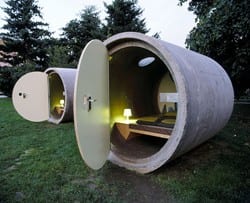 |
| |
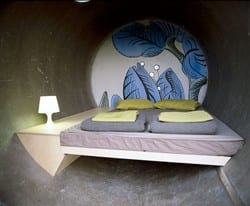 |
| Two views of the dasparkhotel in Ottensheim, Austria, made from recycled drain pipes. |
| |
RT: There’s no better marketing technique than a ‘Keep Out’ sign, is there?
JT: Right. It’s the limited edition approach and the invitation-only approach, but not in the old way of exclusion. It shouldn’t be that. I went up to the concierge and said, ‘Hey, my friend wanted me to meet him on the 18th floor,’ and he says, ‘Private events until the 29th.’ And I tell him, ‘I am here for information. Please be more informative. Give me the lowdown.’ And then he starts giving me the lowdown. Because they just want to brush people off, so you feel excluded. That isn’t the way to go. That is so old, and so stupid. It has to be more of an invitational feel, but not an exclusionary feel. So it’s a limited edition invitation, but let’s make the invitation accessible, if you provide something that adds to the situation. In the future, we’re going to be seeing a lot of online connection for hotels. This is going to be a big realm. Because, as it becomes clear that we are going to hotels for inspiration, and they’re becoming inspirational centers for us, in ways of living, the hotel will just evolve and get better and better at that. Whether it’s come here and learn how to live eco, or come here and be in a place that used to be a jail and learn about how great it is to be free. It is just edutainment mixed with evolution. It’s evolutionary edutainment. And we’re also doing a lot of reuse, that’s another inspirational approach. The big sewer pipes that are being used as little hotels or old 747s as hotels. Those sorts of things are really exciting to us, because they’re opening up a paradigm of how the future could be lived. |
| |
RT: Do you think you would go to a sewer pipe, 747, or shipping crate hotel more than once?
JT: If it was comfortable.
RT: If It was comfortable. And alluring. So we want to have all of these experiences, but in order to experience them more than once, we want them to be comfortable, and embracing, and somewhat luxurious. And very considerate.
JT: Comfortable and also to offer community connection somehow. That means there could be a community of people that try out all of the different reuse hotels in the world. They will just send that experience around the world. |
| |
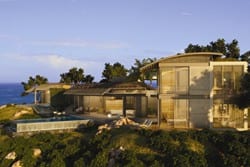 |
| Eco resort Terrazas de Coson in the Dominican Republic, set to open next year. |
|
 |
| |
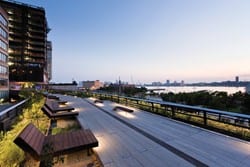 |
| From top: A rendering of High Line, a 1.45-mile-long section of New York’s inactive elevated freight railroad on the West Side that was recently redesigned as a public park by James Corner Field Operations and Diller Scofido + Renfro. Lounge seating on the High Line’s Sun Deck. |
| |
RT: Or even to the point of a walk on the High Line, which is kind of the recommended new New York promenade.
JT: Yes. The reason the Standard is so brilliant is because it gives you a really unique New York experience. So this is multidimensional. It’s unique in that it feels like you’re floating above the city with a lot of space around you. So there’s a lot of bright light and a lot of space. No. 1, that’s unique in New York. No. 2, it has driven a certain sort of excitement for the area, so now we have bridge and tunnel people clashing with high-end people. They’re all coming together in that spot and that mash up is just crazy. Crazy goodness, crazy badness. It’s just really interesting. Plus, the High Line is such a great concept of old and new. The Standard has supported the whole area to change. That’s what people are looking for, a hotel concept that is transformational to the people that attend, and to the people that are living nearby. That’s profound. That’s kind of cool, hip, and neat. But it also can be something like my friend who went to work on a farm for a staycation—well, not a staycation, a ‘meaning’ vacation, where she worked on a farm in Italy to learn how to do sustainable bio-farming. It’s a vacation for two weeks where she learned a skill, and also contributed. And I have a friend who is creating an eco resort in India that is going to be a living example of how to live eco. You go, and you stay there, and you learn how to live eco in your life. |
| |
RT: So destination resorts are becoming much more dimensional. It also needs to have context and a component of education, or interaction, or something that is transformative.
JT: Yes. Multidimensional means that it has to be transformative, informative, experiential.
RT: So that’s really informing destination resorts. The new term ‘eco resort’ is really a kind of destination resort. And the adventure resort?
JT: Adventure resorts are what I call ‘edutainment.’ We are entertaining ourselves with it. |
| |
RT: I love that word. It’s like my ‘evocatecture.’
JT: Yes, that’s great. Yes, ‘edutainment.’ Because there are so many worries in the world, because things are shifting, we are now looking for solution-driven components, along with transformational. We want to know that our brands, and our hotels, and everything we’re engaged in bring something to evolve us and grow us. This could be either as a better business person, which means you could have all sorts of different lectures and conferences, or, as a better emotional person, to infuse my emotional intelligence. Also to increase my social skills, and to be in the coolest of the cool places, and to be able to say, I was there. I can twitter about it. That makes me socially viable. |
| |
RT: So it sounds like one would select a resort for a focus, but that it has to be multi-dimensional. Because the single focus is just not enough any more.
JT: Because we’ve integrated the ideas of having the great showerhead, and the great bed, and those are becoming kind of normal. So that’s why I say it’s evolutionary, or evolving. We have the great living room space. We have the great outdoor area. We have the great dining. We have the great bar. And we have all of those cool elements. Now, it’s about locality and how it influences the local, and how we can engage with the local. And also, it has to do with econographic (experience in terms of, ‘I can talk about this to friends and say I did this.’) The 18th floor of the Standard is not open yet, and it’s the same old idea of private, private, private, no one can get in. And then when people can get in, it will just be flooded.
|
| |
| |
| |
|
RT: So do you think that with the trends we see now, if a boutique hotel is seen as something that is a small hotel that’s trying to appeal too trendy, it’s just embarrassing. Do you think the boutique hotel will survive? Or evolve?
JT: Everything is evolving, because of the big disruption of the economy. So we’re turning away from economics to ethonomics, meaning it has to have something of more substance than just boutique-y coolness. It’s been evolving already for the last couple of years. And we’re all evolving. There’s a new documentary called Lemonade, and I think this is going to inform a lot of businesses, because so many people have lost their jobs, and now they’re becoming entrepreneurs, and they’re [following their] passions. I’m speaking to banks about this. We’re speaking on the changing future of work. It’s becoming more mobile, which means that that would influence the hotel industry as well. So Lemonade asks, ‘how do you turn something into something else?’ So that’s what we’re talking about here. It is a transformative time. And how transformational you are [correlates with] how successful you will be. |
| |
RT: So that’s also true of chain hotels.
JT: Yes. The chain hotel has a niche if they are quality low budget, because that is something that we’ll need in these times.
RT: And what about the quality, high budget, like Four Seasons?
JT: There will always be high-end business travel, but people’s idea of luxury is changing. We will still have luxury the way it was, in part because people will want to have a retro experience of what luxury used to be, as a reminder and a remembrance. It’ll be vintage joy. |
| |
RT: So what will be the new luxury?
JT: I think this is more like intriguing edutainment, intriguing experiential that’s transformational. Like all of my friends who are making money are spending it on something like a National Geographic vacation. Something that gives you substance to talk about, because while a lot of us are really moving toward kind of grownup, unreal sort of experiences—because fantasy is always going to be great—a majority feel that status has changed. It’s less about materialism, and more about smart ways of living, the kind that informs and contributes to society.
RT: Is accomplishment part of that?
JT: Yes, accomplishment in a way that is not taking away from society.
RT: Constructive accomplishment.
JT: Yes, and skill set sharing. So now status skills and status stories are really about your greatness, but also the percentage of contribution that you’re doing. We call that Generation G, or Generation Generosity, which goes across all generations. It’s about aligning everything you do as some sort of giveback. We thought of another big trend. And that means that people will also be looking for ways to get totally off and totally on. Totally off means I want nothing to do with my media and my Blackberry, and so I’m going to some place remote and have an experience that’s just totally earth. Or, they’ll be totally on and they want to be right in the thick of it, and those are the future trends of introducing and including evolutionary social media that connects with your hotel experience. Because we have so many apps now that allow us to know where we’re at and what’s around us. And that’s only going to increase. Those sort of entryways, such as the ones where you go somewhere, and you’re at the hotel, boom! you push your app and it shows you everything around you. Pretty soon those stories will become more engaged and more evolved. And for hotels to link up with that, and to have their own software that allows you to get to know the area, and get to know the people staying there, if you so wish, could be a future avenue for hotels to become more community relevant, and not just the mobile community within their walls.
|
| |
RT: I’ve got one more question. How can green be luxurious? Because you not only know trends, but I’ve always been impressed with your connectedness to the eco issues. How can I be green and not give up what I perceive as luxurious?
JT: Two things. First, everything I’ve talked about is really along the lines of greening, because it’s about educating ourselves, it’s about living in harmony, it’s about growing ourselves as human beings. It’s about giving back to society. The main big thing is climate warming, and how we can contribute. So from here forward, all materials should be sustainable and all foods should be locally sourced. If you want to be a viable business going forward, you align with those principles now. Also, eco is about the fact that local and handmade can be of the highest quality. It could also be iconographic, meaning that if it’s something that will last a long time and that you’re not discarding, then that can be quality as well. To me, eco luxury is when you have recycling in the hotel, because, that’s a basic. Travel can be really wasteful. And also, to have a carbon offset option in everything that you do.
Jody Turner is founder of Culture of Future, a global future trend analysis organization.
|
| |
|
| |
| |
|
|

